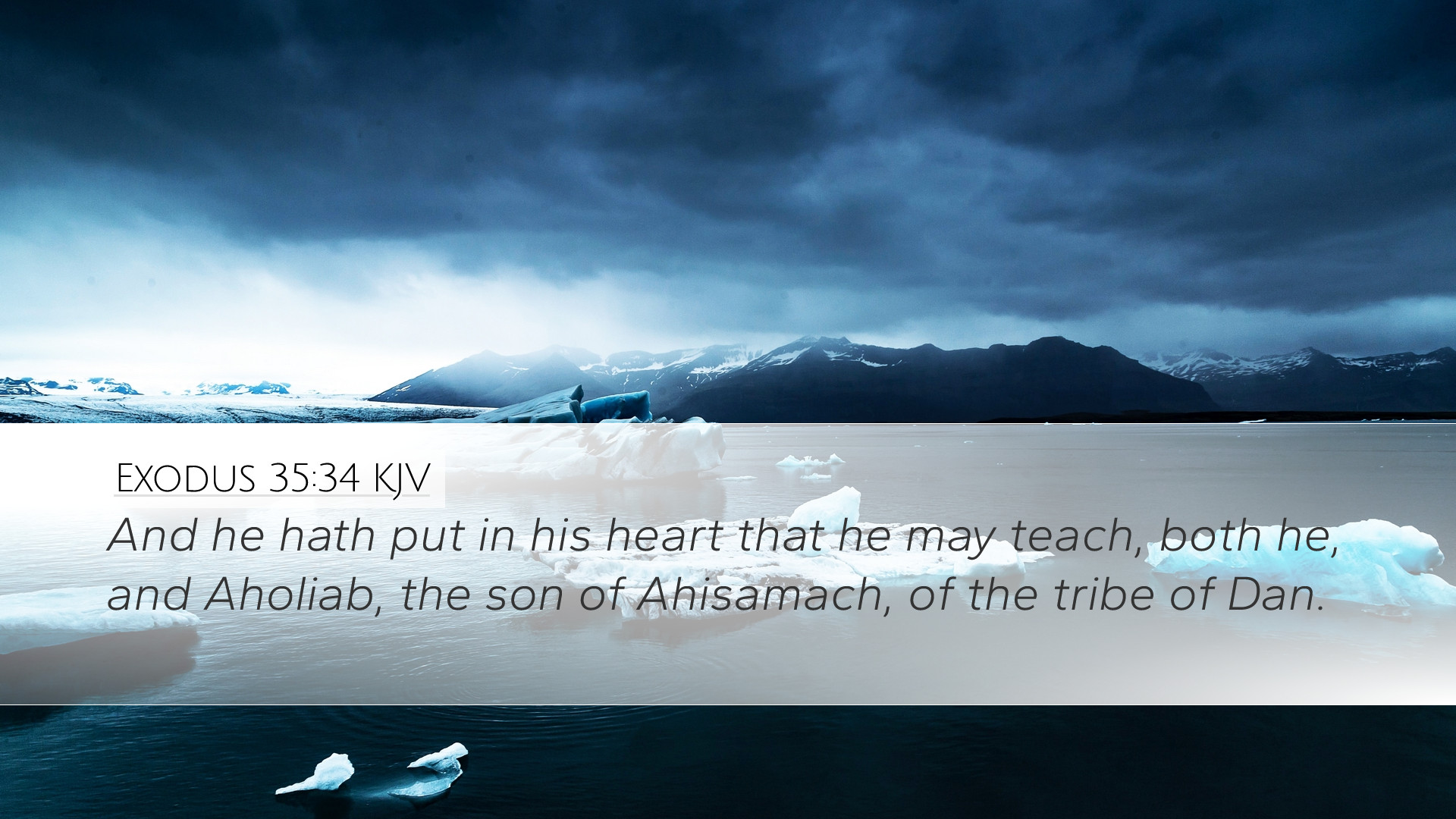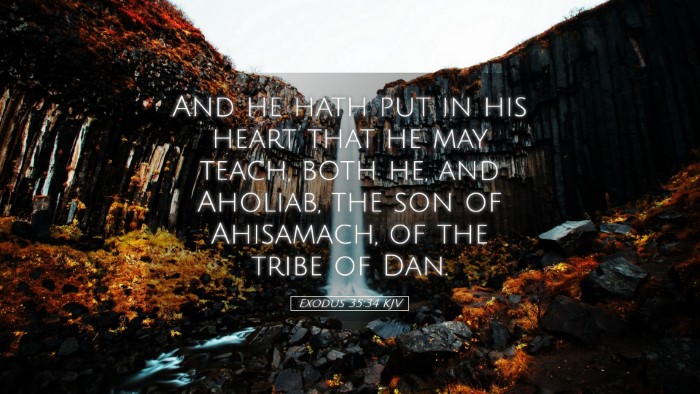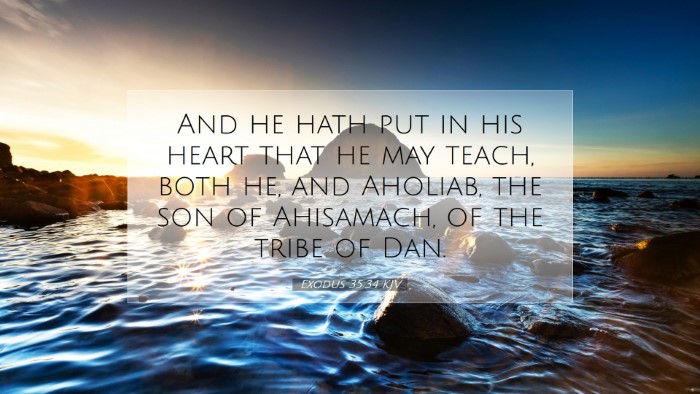Commentary on Exodus 35:34
Exodus 35:34 states, "And he hath put in his heart that he may teach, both he and Aholiab, the son of Ahisamach, of the tribe of Dan."
Introduction
Exodus 35:34 highlights two of the primary artisans chosen by God to lead the work of crafting the elements of worship for the Tabernacle. This verse provides insight into divine selection, the role of spiritual gifting, and communal responsibility in fulfilling God's commands. Insights from classic public domain commentaries such as those by Matthew Henry, Albert Barnes, and Adam Clarke elucidate the significance of this verse in both its historical context and its application for current ministry.
Divine Calling and Empowerment
God’s Sovereign Choice: Commentators agree that the selection of Bezalel and Aholiab was a direct act of divine sovereignty. Matthew Henry emphasizes that even within the practical tasks of building the Tabernacle, God’s hand is evident as He equips individuals for His specific purposes. Henry notes, "It is God who raises up men for service; He fits them for it, and He employs them in His work."
The Role of the Heart: The phrase "put in his heart" indicates a profound internal motivation—an eagerness to teach and to engage in the sacred work. Albert Barnes comments that this internal disposition is crucial for anyone involved in ministry. He asserts that true teaching stems not merely from knowledge but from a heart attuned to God’s will. This divine enablement suggests that God prepares His selected servants not only with skill but also with passion for His work.
The Importance of Teaching in Ministry
Teaching as a Ministry Component: Scripture consistently emphasizes the importance of teaching, particularly in the context of worship and community. Adam Clarke points out that the role of Aholiab alongside Bezalel points to the necessity of collaboration in ministry. In communal worship settings, teaching extends beyond mere instruction to embody mentoring, guidance, and the encouragement of spiritual growth.
Equipping the Saints: The New Testament reiterates this call to equip the congregation for ministry (Ephesians 4:11-12). Bezalel and Aholiab’s roles symbolize a foundational principle of equipping others. Their capacity to teach signifies the responsibility laid upon church leaders today—those who are called to empower members of their congregations to utilize their gifts effectively.
The Gifts and Skills Provided by God
Spiritual Gifts for Service: In this passage, the notion of artistic skill becomes closely entwined with spiritual gifting. This concept is extensively outlined by Matthew Henry, who notes that God grants the abilities necessary for successful ministry. He observes that, "These artisans were not only skilled but spirited—endued with wisdom and understanding, making them equipped for the tasks assigned."
Collaboration and Community: Both Bezalel and Aholiab represent the broader community of believers who are called to engage in meaningful ministry together. The work of the Tabernacle serves as an instructive model for the church today; it is built upon the collective offerings of individuals responding to God’s calling, as highlighted by Albert Barnes. This illustrates that ministry thrives in a context of collaboration where each member contributes to the common good.
Implications for Pastoral Ministry
Recognizing and Encouraging Giftedness: Pastors are encouraged to recognize and nurture the gifts present within their congregations. Clarke emphasizes the necessity for leaders to be attentive in identifying those whom God has called—both in spiritual and practical matters. This awareness fosters an environment conducive to growth and participation in ministry.
Being An Example: Just as Bezalel and Aholiab were not only skilled artisans but also teachers, church leaders are called to lead by example. Their lives must reflect the truth they teach, according to Henry, who states, "The teacher must first be taught; they must be models of the faith they impart." This emphasizes integrity and authenticity as central to effective ministry.
Theological Reflections
The Nature of God’s Spirit: The active presence of God’s Spirit in the selection of Bezalel and Aholiab serves as a theological cornerstone for understanding how divinely appointed leaders operate. God not only calls individuals but also equips them with specific skills and a heart to teach. This understanding fosters reliance on prayer and spiritual discernment for ministry leaders seeking God’s guidance.
Celebration of Diversity: In examining God’s chosen workers, we see a celebration of diverse gifts and abilities. Clarke remarks that the richness of the Tabernacle's construction embodied the variety of talents among God’s people. This stands as a reminder for the church to honor and value diversity in spiritual gifts today, creating a culture where each individual's contribution is recognized and celebrated.
Conclusion
Exodus 35:34 serves as a profound reminder of God’s divine orchestration in ministry. It illustrates that God not only calls but also equips His people for His purposes. Through the examples of Bezalel and Aholiab, we are encouraged to embrace our roles in community, recognize and develop our gifts, and participate wholeheartedly in the sacred work of building the Kingdom of God. This commitment to teaching, collaboration, and reliance on God’s Spirit shapes our understanding of ministry and drives us toward more effective service in the church today.


